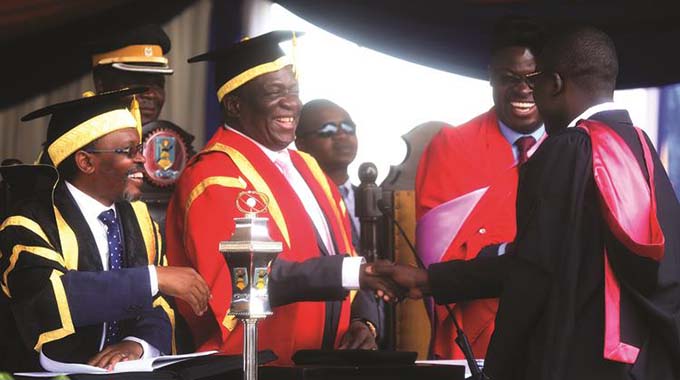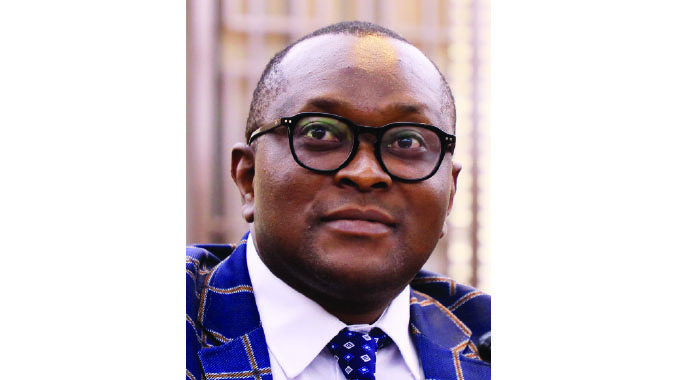ED challenges graduates to modernise Zim industry

Bulawayo Bureau
PRESIDENT Mnangagwa yesterday challenged universities and colleges to ensure their graduates are equipped to provide solutions, services and products to propel Zimbabwe’s modernisation and industrialisation agenda towards the attainment of Vision 2030.
He was accepting an honorary Doctorate in the Philosophy of Education (Honoris Causa) by the National University of Science and Technology (NUST) during the institution’s 25th graduation ceremony in Bulawayo.
“Equally, we must all aim to realise functional education which meets the needs of our communities and aims at improving their quality of life,” said President Mnangagwa. “I challenge graduates to press on to do the extraordinary by inventing, designing and manufacturing products and artefacts from locally incubated ideas and researches.”
The President said NUST had an obligation to produce graduates who were the bedrock and foundation of the country’s science, technology, engineering and innovation revolution by virtue of being located in Bulawayo, which is the country’s industrial hub.
“To this end, the university is challenged to correctly situate itself as a key contributor to the speedy attainment of the modernisation and industrial agenda as well as Vision 2030,” he said.
“I also call upon the corporate sector to nurture partnerships with our institutions of higher learning as well as develop backward and forward linkages that will facilitate the development of innovations which are proudly Zimbabwean products.”
President Mnangagwa reiterated Government’s full commitment to support innovative talents, viable socio-economic projects and provision of mentorship to innovative ideas.
“We need disruptive thinkers who are agents for positive transformation and the modernisation of our economy in line with our vision to attain an upper middle-income status by 2030,” he said.
“It is in this context that all economic sectors, Government departments, captains of industry and commerce, among other institutions must work closely with universities such as NUST, to address our weak points, reinforce our strengths and move our country forward and grow our economy.”
President Mnangagwa urged graduates to be patriotic and serve their communities and families with humility and compassion.
He paid tribute to parents and guardians of the graduates for their immense sacrifices to ensure that their children’s goals were achieved.
President Mnangagwa capped 2 652 students at the NUST’s 25th graduation ceremony.
The graduates were drawn from the Faculties of Applied Sciences, the Built Environment, Commerce, Communication and Information Science, Engineering, Science and Technology Education, and Medicine.
The colourful ceremony began shortly after 10am when President Mnangagwa, who is the Chancellor of all State universities, led the academic procession into the NUST Sports Grounds where the graduates, their friends and relatives were waiting.
Out of the 2 652 students who graduated, six were holders of doctoral degrees, 678 masters’ degrees and 1 968 graduated with bachelors’ degrees.
Of the 1 968 bachelor degree recipients, 1 063 (54,01 percent) were men while 905, which translates to 45,99 percent, were women.
At masters’ level, there were 373 men and 305 women, while those who graduated at PhD level, four were men, while two were women.
Among those who graduated were the leader of Zimbabwe Hospital Doctors Association (ZHDA) Dr Peter Magombeyi, who was, however, not present, and former Chronicle interns, Prince Sunduzani, Nyaradzo Bakari and Codelia Mondela.
In his report, the university’s Vice Chancellor, Professor Mqhele Dlodlo, said NUST remains one of the key centres of educational excellence in the country and regionally as evidenced by collaborations with universities from other neighbouring countries in various areas of partnerships.
He said despite numerous challenges, the university made great strides in redirecting to the realisation of its mandate as a science, technology, engineering and mathematics (STEM) university.
“We are in the process of enhancing the design of the main campus,” said Prof Dlodlo.
“In addition to that, we are also increasing our footprints throughout the Sadc and further afield by way of affiliations and associations with STEM-biased institutions led by like-minded institutional leadership.
“To top it all, if the other vice chancellors in the convocation were to enumerate the achievements of their alumni, we would all be awe-stricken to say the least. That simply points to Zimbabweans and our education system as next to none.”
The university has since its inception in 1991 expanded its basket of distinguished offerings to 45 teaching departments in seven faculties along with institutes, centres of excellence, a graduate school of business in support of its entrepreneurial thrust as a university and affiliate institutions both within and outside the country.
Collectively, NUST offers 50 undergraduate and 48 post-graduate degree programmes.







Comments